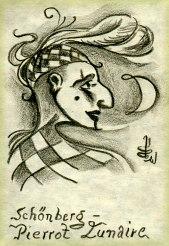 It struck me today that two of my favorite works employ similar, yet contrasting, alternative approaches to vocal delivery that suggest a significant aesthetic road not yet fully explored.
It struck me today that two of my favorite works employ similar, yet contrasting, alternative approaches to vocal delivery that suggest a significant aesthetic road not yet fully explored.Language and speech hold a peculiar facination for me as I struggle with competing forces of acceptance and rejection. The first hurdle is the concrete quality of words as sonic vessals that carry meanings quite independent from their "meanings." Something about the frequent mismatch between semantics and acoustics often rubs me the wrong way. But when this issue is resolved the result is transcendent. The second hurdle is delivery. The esteemed Euro-classical operatic tradition of wide vibratos and sustained tones that shatter spoken rhythmic structure is at best and acquired taste. With all due respect for the literature, tradition and discipline that supports this vocal style I personally find it aesthetically abhorent and look toward Pierrot Lunaire by Arnold Schoenberg and The 17 Lyrics of Li Po by Harry Partch
 as important cues toward writing out of the corner musical culture has painted itself into.
as important cues toward writing out of the corner musical culture has painted itself into.Pierrot Lunaire employs a vocal style called sprechgesang, which is frequently described as being somewhere between speaking and singing. It is notated with an "x" drawn through the stem of the notes in the vocal part and I have often employed it in my own works. This technique absolves the vocalist from sustaining pitches as the rhythmic quality of the vocal part moves into focus. This technique allows for greater flexibility in composing atonal lines for voice and also tends to "speed up" the rate of text delivery so that poetry doesn't get drawn out across torturous sustained, vibrato-heavy tones.
The 17 Lyrics of Li Po features an intoned delivery oriented toward preserving the natural rhythms and inflections of spoken poetry. The instrumentation is paired down to a re-invented bard-like aesthetic of voice accompanied by an "adapted viola" (one of Partch's first instruments, a viola with a long cello fingerboard with color markings for the just intervals). Partch recognized the expressive potential of natural sounding speech as again the text delivery rate is sped up so that the poetry can survive the medium.
Shoenberg and Partch arrived at these similar vocal approaches from two completely different angles. In the end I think they hit at something that lends greater integrity to the text than traditional song form normally allows.
An interesting similarity is that neither of these works is set in the native language of their respective source material. The French poetry of Albert Giraud is set in German. (The spiky, free atonal music of Pierrot Lunaire is well suited to the sonic peculiarities of the German language.) While Li Po's poignant verse is delivered in English resulting in a sound, manner and aesthetic that is uniquely American (and an important work in the "American Maverick" tradition).
This spoken delivery approach to vocal composition suggests an important resolution to the aesthetic issues of text music. The issue of "meaning" can only be confronted on a piece-by-piece basis. With my current project, Salt Tea for voice, violin, cello and re-tuned piano, I try to resolve this aesthetic conundrum by employing anagrams on the base text so the "meanings" are systematically drained over time. The individual "meaning" of words are preserved, yet the narrative and syntactic logic audibly breaks apart. The idea of applying a transitory operation to words in the same manner one would with the abstract elements of music through transposition, inversion or retrograde procedures is enormously appealing.


No comments:
Post a Comment